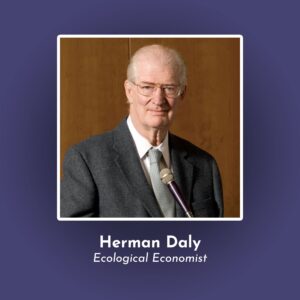
Ep 6 | Herman Daly
Herman Daly: “Toward an Ecological Economics”
On this episode, we meet with ecological economist and professor emeritus at the University of Maryland, Herman Daly.
Daly discusses the biophysical underpinnings of human economies, and how a social system that is more tethered to our ecological reality might come into being.
Daly explains how the transformation from classical economics to neoclassical economics created an understanding of the world that prioritized utility and money above all else. How did neoclassical economics contribute to our current predicament?
Further, Daly explores what he believes to be the best-case scenario humans face in the next decade.
About Herman Daly
Herman Daly is Professor Emeritus of economics at the University of Maryland School of Public Policy, former senior economist at the World Bank, and a founder of the field of ecological economics. He is the author of For The Common Good, Valuing the Earth, the textbook Ecological Economics, and many other books, essays, and academic papers
In French, we have a motto that says that a simple drawing is often better than a long explanation. Jean-Marc Jancovici Carbone 4 President
That’s very understandable because with left atmosphere thinking, one of the problems is that you see everything as a series of problems that must have solutions. Iain McGilchrist Neuroscientist and Philosopher
We can’t have hundreds and hundreds of real relationships that are healthy because that requires time and effort and full attention and awareness of being in real relationship and conversation with the other human. Nate Hagens Director of ISEOF
This is the crux of the whole problem. Individual parts of nature are more valuable than the biocomplexity of nature. Thomas Crowther Founder Restor
Show Notes & Links to Learn More
Download transcript00:45 – Herman Daly works
06:25 – Nicholas Georgescu-Roegen + The Entropy Law and the Economic Process
08:26 – Silent Spring Rachel Carson
08:57 – We live in an energy and materials economy
09:14 – Environmental externalities
09:54 – Ecological economics
11:36 – Kenneth Boulding
14:56 – Space flights/colonization
15:44 – William Shatner flight response
18:14 – Canonical assumptions
19:55 – Alfred Marshall
20:25 – Law of diminishing returns
20:47 – Neoclassical economics
21:38 – Herman Daly’s Economics for a Full World Flyer
23:55 – Law of diminishing marginal utility
24:08 – Water-diamonds paradox
26:03 – A barrel of oil does 5 years of human labor
26:22 – We underpay for the main input to our economies
26:42 – Energy cannot be substituted
26:57 – Cobb-Douglas production function
27:45 – Robert Solow
28:49 – Reiner Kümmel
30:17 – Economics for the Future paper
30:38 – Too big too fail policies
30:57 – 20% of Americans went broke during COVID
32:22 – Frederick Soddy and sub-atomic energy
33:45 – Laws of thermodynamics
34:58 – Fractional reserve banking
35:15 – Soddy Pig example
36:23 – Debt is a claim on future energy
38:07 – Marginal costs equals marginal benefits
45:00 – Untax Project
45:23 – Value added tax
47:30 – Carbon tax vs cap and trade
49:50 – Quantitative easing
51:29 – Steady state economy
1:00:28 – Truth is outcompeted by identity
1:01:27 – Drain America First







